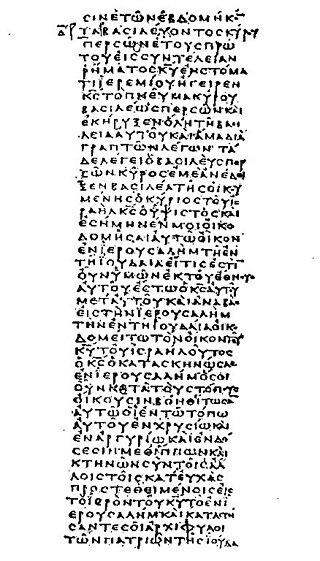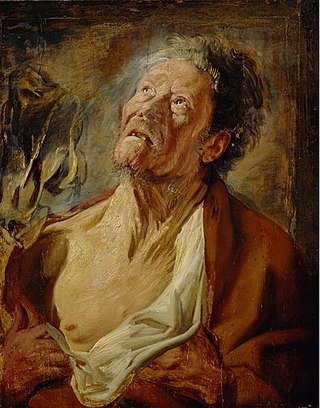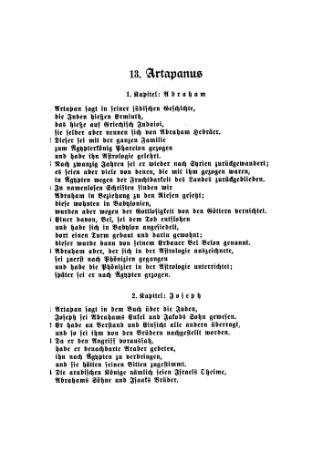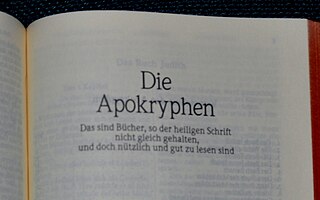Related Research Articles
The deuterocanonical books, meaning "Of, pertaining to, or constituting a second canon," collectively known as the Deuterocanon (DC), are certain books and passages considered to be canonical books of the Old Testament by the Catholic Church, the Eastern Orthodox Church, the Oriental Orthodox Churches and the Assyrian Church of the East, but which modern Jews and many Protestants regard as Apocrypha.

The Septuagint, sometimes referred to as the Greek Old Testament or The Translation of the Seventy, and often abbreviated as LXX, is the earliest extant Greek translation of the Hebrew Bible from the original Hebrew. The full Greek title derives from the story recorded in the Letter of Aristeas to Philocrates that "the laws of the Jews" were translated into the Greek language at the request of Ptolemy II Philadelphus by seventy-two Hebrew translators—six from each of the Twelve Tribes of Israel.

The Book of Enoch is an ancient Jewish apocalyptic religious text, ascribed by tradition to the patriarch Enoch who was the father of Methuselah and the great-grandfather of Noah. The Book of Enoch contains unique material on the origins of demons and Nephilim, why some angels fell from heaven, an explanation of why the Genesis flood was morally necessary, and a prophetic exposition of the thousand-year reign of the Messiah. Three books are traditionally attributed to Enoch, including the distinct works 2 Enoch and 3 Enoch. None of the three are considered to be canonical scripture by most Jewish or Christian church bodies.

The Sibylline Oracles are a collection of oracular utterances written in Greek hexameters ascribed to the Sibyls, prophetesses who uttered divine revelations in a frenzied state. Fourteen books and eight fragments of Sibylline Oracles survive, in an edition of the 6th or 7th century AD. They are not to be confused with the original Sibylline Books of the ancient Etruscans and Romans which were burned by order of the Roman general Flavius Stilicho in the 4th century AD. Instead, the text is an "odd pastiche" of Hellenistic and Roman mythology interspersed with Jewish, Gnostic and early Christian legend.
The Life of Adam and Eve, also known in its Greek version as the Apocalypse of Moses, is a Jewish apocryphal group of writings. It recounts the lives of Adam and Eve from after their expulsion from the Garden of Eden to their deaths. It provides more detail about the Fall of Man, including Eve's version of the story. Satan explains that he rebelled when God commanded him to bow down to Adam. After Adam dies, he and all his descendants are promised a resurrection.
Pseudo-Philo is the name commonly used for the unknown, anonymous author of the Biblical Antiquities. This text is also commonly known today under the Latin title Liber Antiquitatum Biblicarum, a title that is not found in the Latin manuscripts. Although probably originally written in Hebrew, it is preserved today only through a Latin translation found in 18 complete and 3 fragmentary manuscripts that date between the eleventh and fifteenth centuries CE. In addition, material paralleling that in the Biblical Antiquities is also found in the Chronicles of Jerahmeel, a 14th-century Hebrew composition. The Latin text of the Biblical Antiquities circulated alongside Latin translations of the authentic writings of Philo of Alexandria. Scholars have long recognized the pseudonymous character of the text now known as the Biblical Antiquities. Primary in this regard is a vastly differing approach to and use of the Jewish scriptures. For the sake of convenience, scholars continue to follow the lead of Leopold Cohn in calling the unknown author "Pseudo-Philo".
The Prayer of Manasseh is a short, penitential prayer attributed to king Manasseh of Judah.

The Testament of Job is a book written in the 1st century BC or the 1st century AD. The earliest surviving manuscript is in Coptic, of the 5th century; other early surviving manuscripts are in Greek and Old Slavonic.

4 Maccabees, also called the Fourth Book of Maccabees and possibly originally known as On the Sovereignty of Reason, is a book written in Koine Greek, likely in the 1st or early 2nd century. It is a homily or philosophic discourse praising the supremacy of pious reason over passion. It is a work that combines Hellenistic Judaism with influence from Greek philosophy, particularly the school of Stoicism.
Psalm 151 is a short psalm found in most copies of the Septuagint (LXX), but not in the Masoretic Text of the Hebrew Bible. The title given to this psalm in the Septuagint indicates that it is supernumerary, as no number is affixed to it. The psalm is ascribed to David. It is also included in some manuscripts of the Peshitta. The psalm concerns the story of David and Goliath.
The Odes of Solomon are a collection of 42 odes attributed to Solomon. There used to be confusion among scholars on the dating of the Odes of Solomon; however, most scholars date it to somewhere between 70-125 AD. The original language of the Odes is thought to have been either Greek or Syriac, and the majority of scholars believe it to have been written by a Jewish Christian, very likely a convert from the Essene community to Christianity, because it contains multiple similarities to writings found in Qumran and to the Gospel of John. Some have argued that the writer had even personally seen John the Baptist

Joseph and Asenath is a narrative that dates from between 200 BCE and 200 CE. It concerns the Hebrew patriarch Joseph and his marriage to Asenath, expanding the fleeting mentions of their relationship in the Book of Genesis. The text was translated widely, including into Amharic, Arabic, Armenian, Early Modern German, Latin, Middle English, Old French, Romanian, Serbian and Syriac.
Psalms 152 to 155 are additional Psalms found in two Syriac biblical manuscripts and several manuscripts of Elijah of Anbar's "Book of Discipline", first identified by the orientalist librarian Giuseppe Simone Assemani in 1759. Together with Psalm 151 they are also called the Five Apocryphal Psalms of David or the "Five Syriac Psalms". In addition to Psalm 151, Psalms 154-155 were found in the Dead Sea Scrolls in 11QPsa, though 151-155 all were likely composed in Hebrew.
The Lost Books of the Bible and the Forgotten Books of Eden (1926) is a collection of 17th-century and 18th-century English translations of some Old Testament Pseudepigrapha and New Testament Apocrypha, some of which were assembled in the 1820s, and then republished with the current title in 1926.

Artapanus of Alexandria was a historian, of Alexandrian Jewish origin, who is believed to have lived in Alexandria, during the later half of the 3rd or 2nd century BCE. Although most scholars assume Artapanus lived in Alexandria, others argue he resided in the countryside. Regardless, Artapanus lived in Egypt.
The Testament of Abraham is a pseudepigraphic text of the Old Testament. Probably composed in the 1st or 2nd century AD, it is of Jewish origin and is usually considered to be part of the apocalyptic literature. It is regarded as scripture by Beta Israel Ethiopian Jews, but not by any other Jewish or Christian groups. It is often treated as one of a trio of very similar works, the other two of which are the Testament of Isaac and Testament of Jacob, though there is no reason to assume that they were originally a single work. All three works are based on the Blessing of Jacob, found in the Bible, in their style.
Pseudo-Phocylides is an apocryphal work, at one time, claiming to have been written by Phocylides, a Greek philosopher of the 6th century BC. Its authorship was deciphered by Jacob Bernays. The text is noticeably Jewish, and depends on the Septuagint, although it does not make direct references to either the Hebrew Bible or Judaism. Textual and linguistic studies point to the work as having originally been written in Greek, and having originated somewhere between 100BC and 100AD, although the oldest surviving manuscripts date from the 10th century AD.

The biblical apocrypha denotes the collection of apocryphal ancient books thought to have been written some time between 200 BC and 100 AD.
The Old Testament is the first section of the two-part Christian biblical canon; the second section is the New Testament. The Old Testament includes the books of the Hebrew Bible (Tanakh) or protocanon, and in various Christian denominations also includes deuterocanonical books. Orthodox Christians, Catholics and Protestants use different canons, which differ with respect to the texts that are included in the Old Testament.
Demetrius the Chronographer was a Jewish chronicler (historian) of the late 3rd century BCE, who lived probably in Alexandria and wrote in Greek.
References
- ↑ "NETS: Electronic Edition". Ccat.sas.upenn.edu. 2011-02-11. Retrieved 2014-02-08.
- 1 2 3 4 R. B. Wright, Psalms of Solomon (First Century B.C.). A New Translation and Introduction, in James H. Charlesworth (1985), The Old Testament Pseudoepigrapha, Garden City, NY: Doubleday & Company Inc., Volume 2, ISBN 0-385-09630-5 (Vol. 1), ISBN 0-385-18813-7 (Vol. 2), p. 639
- ↑ Beale, G. K. Book of Revelation. p. 633. (Eerdmans: New International Greek Testament Commentary, 1998).
- ↑ Wright, R. B. The Old Testament Pseudepigrapha. p. 2:653. (Hendrickson Publishers, 2 vols, Ed. James H. Charlesworth, 2010).